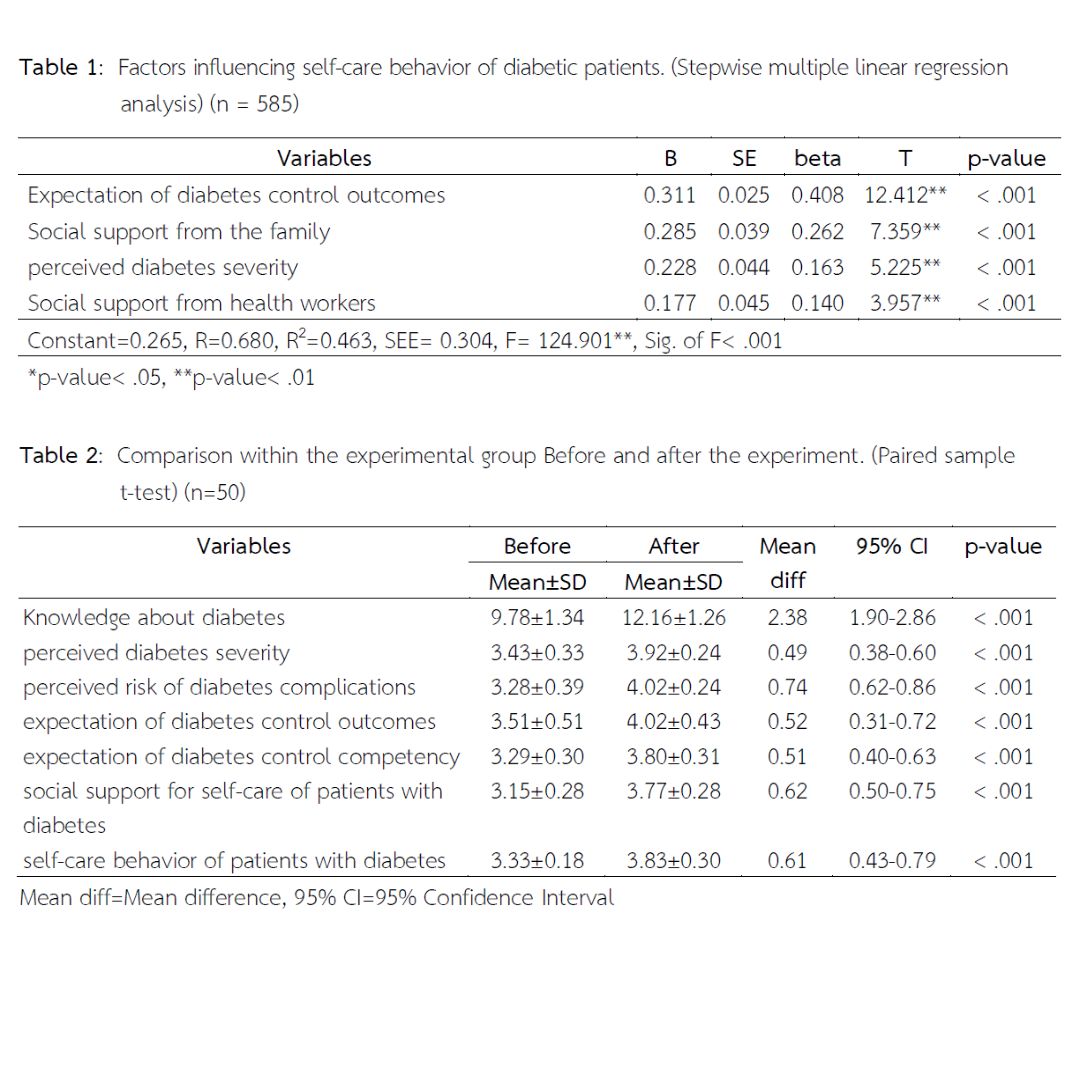DEVELOPMENT FOR DIABETES PATIENT CARE MODEL BY COMMUNITY PARTICIPATION CHAIYAPHUM PROVINCE
Keywords:
Diabetes patients, Self-care behavior, Community participationAbstract
This research and development used a mixed research design. The purpose of this mixed methods research was to develop a diabetes care model with community participation in Chaiyaphum Province. The study consisted of 3 phases: 1) studying the factors influencing self-care behavior of diabetes with patients in Chaiyaphum Province, 2) developing a diabetes care model with community participation in Chaiyaphum Province, and 3) investigating the effectiveness of the diabetes care model with community participation in Chaiyaphum Province. The research was conducted between January 2023 and May 2024. The instruments used for data collection were a questionnaire and focus group discussion. The statistics used for data analysis included descriptive statistics and inferential statistics, including stepwise multiple regression, t-test, analysis of covariance, and content analysis. The results of this study were as follows: 1) The factors influencing self-care behavior of patients with diabetes in Chaiyaphum Province were expectation of diabetes control outcomes, social support from family, perceived diabetes severity, and social support from health team. These four variables together predicted self-care behavior of patients with diabetes by 46.3%. 2) The diabetes care model with community participation in Chaiyaphum Province was called the AFTER model, consisting of Assessment, Family support, Health Team support and Evaluation and Reflection. 3) After the implementation of the diabetes care model, It was found that the experimental group had knowledge about diabetes, perception of diabetes severity, perception of risk of diabetes complications, expectation of diabetes control results, expectation of diabetes control ability, social support for self-care in diabetic patients, and self-care behavior in diabetic patients which were significantly higher than before the experiment and the control group at a statistical significance level of .05.
References
Alrasasimah AW. & Alsabaani A. (2024). Predictors of Diabetes Self-Management Behaviour Among Type2 Diabetics in Saudi Arabia: A Cross-Sectional Study. Diabetes, Metabolic Syndrome and Obesity, 17,2371–2384.
Best, J. W. (1997). Research in education (3rd ed.). Prentice-Hall.
Bloom, B.S. (1964). Taxonomy of Education Objectives, Handbook 1: Cognitive Domain. New York: David Mekey.
Boonprasit S. et al. (2016). Factors related to self-management for controlling plasma glucose in Uncontrolled diabetes elderly. Journal of Boromarajonani College of Nursing, Bangkok, 32(1), 44-56.
Chunroum K. et al. (2016). Self-care of patients with type 2 diabetes mellitus: Development of model integration with AIC technique (Sukhirin Hospital). The Southern College Network Journal of Nursing and Public Health, 3(3), 179–191.
Damrongphong, W. (2022). Factors Associated with Self-care Behaviors of Type 2 Diabetes Patients at Sai Ngam Hospital, Kamphaeng Phet Province. Journal of Disease and Health Risk DPC3, 16(2), 51-63.
Deechan, N. et al. (2024). Effects of a Community Participation Program on Management at Kudmakfai Sub-District in Nong Wua So District, Udon Thani Province. Regional Health Promotion Center 9 Journal, 18(1), 111-127.
Division of Non-Communicable Diseases, Ministry of Public Health. (2023). Number and mortality rate with 5 non-communicable diseases. (Cites 2023 Nov 18), Retrieved from http://www.thaincd.com/2016/mission/documents.php?tid=32&gid=1-020
Health Data Center, Chaiyaphum Provencial Health Office. (2024). Illness with major non-communicable diseases (Cites 2024 Jan, 27) Retrieve from https://cpm.hdc.moph.go.th/hdc/reports/report.php?&cat_id=6a1fdf282fd28180eed7d1cfe0155e11&id=29eec762c9591d1f8092da14c7462361
Oba N. et al. (2022). The Experiences of Self-Management in Patients with Uncontrolled Type 2 Diabetes. The Journal of Faculty of Nursing of Burapha University, 30(4), 65-77.
MamaW. (2020). Development of Care Model for Type 2 Diabetes Patients with Who be Treated at Dong Mun Lek Health Promoting Hospital, Muang District, Phetchabun Province. Journal of Health Science and Community Public Health, 3(2), 93-110.
Prayong J. et al. (2020). Development of Care Model for Patients with Chronic Disease by Community Participation in Lamphun Province. Journal of Health Science, 29(5), 803-812.
Putra MM. et al. (2020). Self Care Behavior of the Diabetic Patients in a Primary Health Center in Bali. Indian Journal of Public Health Research & Development, 11(1), 1229-1233.
Rogers, R.W. (1975). A Protection Motivation Theory of Fear Appeals and Attitude Changes. Journal of Psychology, 91, 93-114.
Sadtrakulwatana, V. (2018). The Development of A Chronic Diseases Clinic Model (Diabetes, Hypertension) in Primary Health Care Units, Mueang District, Sing Buri Province. Journal of Preventive Medicine Association of Thailand, 8(1), 24–36.
Sanitlou N. et al. (2019). Sample size calculation using g*power program. Journal of Suvarnabhumi Institute of Technology (Humanities and Social Sciences), 5(1), 496-507.
Teachasub J. et al. (2020). Development of a Community Participation Caring Model for People with Diabetes Mellitus. Nursing Journal CMU, 47(2), 111–121.
Uly N. et al. (2024). Selfcare behavior models based on diabetes self-management education in Palepu City. Multidisciplinary Science Journal, 6(4), 2024038. https://doi.org/10.31893/multiscience.2024038
Wayne, W.D. (1995). Biostatistics: A Foundation of Analysis in the Health Sciences (6th ed.). John Wiley & Sons, Inc.
Wimolwon, T. (2023). The Effect of a Self-management Program of Type 2 Diabetes Mellitus Patients. Journal of Research and Health Innovative Development, 4(2), 18-25.
Woraharn, A. (2018). The Development of a Diabetes Mellitus Self-Caring Model at Lao Khwan Hospital. Regional Health Promotion Center 9 Journal, 12(27), 5-22.
Worasrihiran N. et al. (2022). Effect of Motivation and Social Support Program for Periodontal Disease Preventive Behaviors among Diabetic Patients. Journal of Health Science, 31(5), 883-895.
World Health Organization. (2021). Diabetes. (cited 2023 Aus 18). Retrieved from https://www.who.int/news-room/fact-sheets/detail/diabetes

Downloads
Published
How to Cite
Issue
Section
License
Copyright (c) 2024 Primary Health Care Journal (Northeastern Edition)

This work is licensed under a Creative Commons Attribution-NonCommercial-NoDerivatives 4.0 International License.



